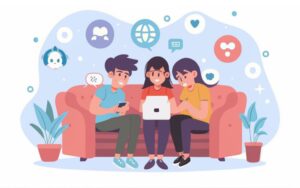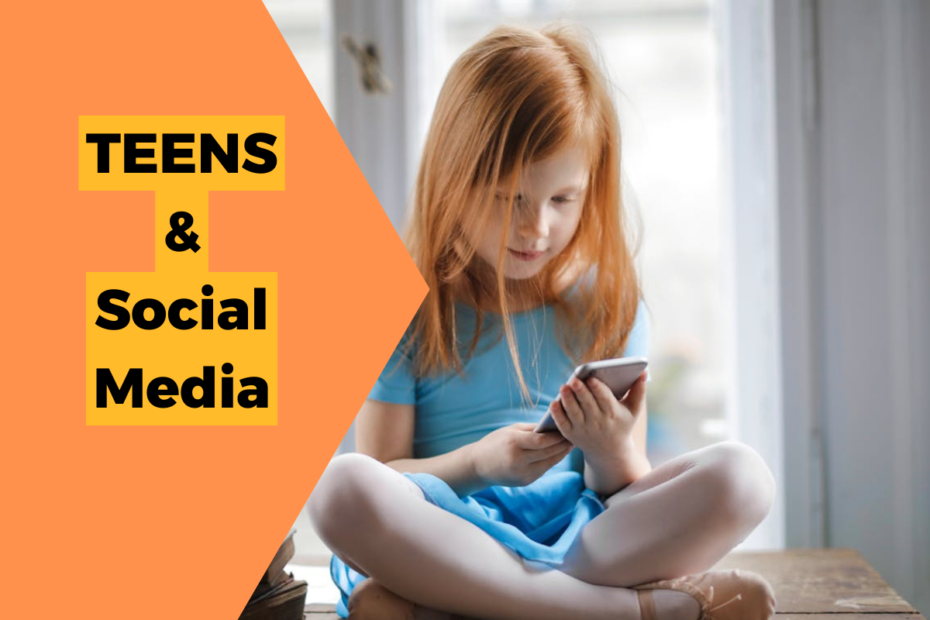Hey Guys I am Donna, and welcome to my parenting blog. As a mother of two, I know how teenagers are addicted to social media nowadays. Using social media too much or in a bad way can affect your child mental health.
So in this article, we’ll talk about keeping your kid safe and giving them power online, from cyberbullying to screen time management.
The health and safety of your kid is very important, and I’ll help you confidently get through these problems.
So stick with me till the end..let’s start.
Statistics About Teenagers and Social Media
A survey of 1,300 13–17-year-olds in the United States in 2022 found that 35% of them use at least one big social media network every day, like Snapchat, Instagram, Facebook, or TikTok.
Researchers found that teens and preteens (12–15 years old) who spent three hours or more a day on social media were more likely to have mental health problems. The study took place in 2013–2014 and included about 6,500 children and teens.
After looking at all of these new studies, it seems that teens and young adults in the United States spend a lot of time on social media (described as daily use for three hours or more). This may be bad for their mental health, especially for the younger teens.
Impact of Social Media on Teenagers’ Mental Health

Using social media before bed can mess up your sleep, which makes it harder to unwind, chill out, and unwind.
Being aware of how bad feelings caused by things you see online can hurt your mental health is very important.
It’s a high amount of information available on the Internet so dealing with social media can also make you feel more anxious and stressed.
let’s find out how these social media can affect your child’s mental health.
1. Sleep Disruption
Too much time spent on social media and trouble sleeping could be bad for teens’ mental health and ability to think and learn. Teenagers need to take care of their sleep.
Screen time too close to bedtime can make it hard to fall asleep. tell them to avoid smartphones during sleeping time.
Putting away their phones before bed can help you sleep better. Blue light exposure slows chemicals that make you sleepy, which shows that technology makes it hard to sleep.
Teenagers sleep better and feel better mentally when they don’t use social media right before bed.
2. Feelings that are bad Ability to
It is possible for teens to feel bad emotions because of the people they interact with on social media.
This can have a big effect on their mental health, putting their general health and emotional stability at risk. When thinking about how social media can be bad for you, the following things should be kept in mind:
To help students deal with the feelings that online exchanges can cause, teach them how to do so.
Teenagers can make it easier for themselves to stay mentally healthy and build resilience while using social media by paying attention to the things listed above.
3. Information Overload Impact
It’s normal for teens to feel stressed when they’re trying to find their way around the internet, especially on social networking sites where there is a steady stream of information. People who use too much digital content may experience cognitive overload, which can make it hard to handle information, make them mentally tired, and make it so that they can’t find any more content online.
Teenagers may find it hard to sort through all the information, which could make it harder for them to focus and make them worry more. Because the material is always coming out, it’s possible to feel mentally and physically worn out.
4. Anxiety and Depression
Understanding the impact of social media on teenagers’ mental health, especially concerning anxiety and depression, is crucial for promoting their overall well-being and resilience in today’s digital age. Adolescents face various challenges navigating social media, which can significantly impact their mental health. Here are some key points to consider:
- Coping strategies: Teaching teens effective coping mechanisms is essential for managing stress and anxiety related to social media.
- Peer support: Encouraging positive interactions with peers can provide emotional support and reduce feelings of isolation.
- Online identity: Helping teens develop a healthy online identity can boost their self-esteem and confidence.
- Mental health: Prioritizing mental health awareness and seeking professional help when needed is vital.
- Social connections: Fostering genuine social connections offline can mitigate the negative effects of social media on mental health.
5. Algorithms Problem
On social media sites, algorithms are set up to show people content that is similar to what they have already interacted with. Over time, this can lead to the formation of echo chambers, which are places where teens are only exposed to points of view that support what they already believe, strengthening those beliefs without encouraging them to think critically or question them.
6. Concerns about mental health
As more people use the internet, it’s important to keep an eye out for pain. Signs include abruptly leaving social groups, big changes in the way you post online, losing interest in activities, or sharing things that are hard to understand or that make you worry.
These changes could be signs of harassment, internet stress, or mental health problems.
7. Cyberbullying
It’s important to teach your child about Social Media usage and cyberbullying.
This is the dangerous thing you are not seeing in a child if it is happening. Teenagers’ mental health problems can be made worse by cyberbullying because they are often in an online setting where they feel vulnerable and alone.
Cyberbullying prevention methods must be given a lot of attention if we want to protect the mental health of teens.
It is very important to do things like teach social media etiquette, encourage digital engagement, and promote online safety. Teenagers can be protected from the bad effects of cyberbullying by keeping an eye out for it and responding to any signs of it online.
Social Media and Teens: why does it matter?

Well, each thing has some positive aspects as well…
Understanding the impact of social media on teens’ mental health is crucial in today’s digital age. Here are key reasons why social media matters for teens:
Helps Them Connect: Social media allows teens to communicate with friends and family. This helps them build their support network.
Develop Confidence: Expressing themselves creatively online can boost teens’ self-esteem. They can share talents and practice social skills.
Teaches Responsibility: Guiding teens to use social media appropriately teaches important responsibility. They learn to consider their impact on others.
Provides Peer Support: Connecting online with peers going through similar life experiences provides validation and comfort.
Offers Learning Opportunities: Social media exposes teens to current events, diverse views, and educational content. This expands their knowledge.
Parental Guidelines on Social Media for Teens
As a parent, you should encourage good relationships and limit their teens’ use of social media. Positive digital travel needs guidance that is right for the user’s age.
For their own mental health, you should tell your kid to use social media healthily and set aside tech-free areas like their bedrooms.
1. Put Healthy Relationships First
You should Keep good relationships on social media should be a top priority if you want to keep an eye on your teen’s online activities and make sure they are safe. Here are some ideas that can help you build good relationships online:
- Build healthy connections by encouraging honest conversation and respect for each other.
- Getting people to leave positive and helpful notes in order to make community interactions more pleasant!
- Setting strong limits and encouraging self-care are ways to put one’s health and happiness first.
- The building of support networks can be done by making real ties with family and friends.
- Taking more safety precautions by watching what people do on the internet and teaching them about the risks of using it.
2. Limit Teens’ Social Media Use
You should set clear limits on how much time your kid can spend on social media. This will help protect both their physical and mental health. Setting limits on screen time is important for keeping a good balance between social and leisure activities, both online and off.
As a parent, you should advise teenagers to take breaks from their smartphones and laptops and do things that happen in the real world to encourage good tech habits. To improve their social skills and mental health, encourage them to make friends outside of technology.
If you keep an eye on their digital health, you’ll be better prepared to help them if problems happen.
3. Age-Appropriate Help is Needed

It is important to make sure that teens have the right kind of social media care for their age. Here are five important things that you should pay the most attention to:
Peer Connections:Teenagers should be supported to make good friends online. Help them make good connections with other people.
Safety First: Teach teens how to use privacy controls, avoid sharing private information, and report cyberbullying.
Mental Health: Make discussing mental health a priority. Provide coping strategies. Watch for signs of emotional distress.
Parental Involvement: Stay involved in your teen’s online activities. Set rules for use. Model responsible social media habits.
Digital Literacy: Educate your teen on judging good information, spotting risks, and crafting a positive online presence.
4. Use Your Social Media Positively
To successfully guide your teen’s use of social media, it is important to stress the importance of safe online behavior and building positive relationships.
It is important to put your mental health first, support creative expression, and make healthy connections if you want to keep a good relationship with social media.
5. There should be no phones in the bedrooms
Having teens keep phones out of their bedrooms can promote better sleep and less social media use. This protects their well-being.
Make sure that bathrooms don’t have phones or screens. This helps kids’ brains shut down before bed, which leads to better sleep. You might want to buy them old-fashioned alarm clocks so they can still get up on time.
Choose certain areas of the home to make completely technology-free. The kitchen and dining room, for example. These spaces then encourage true quality time together. Play fun games or simply talk while making meals and eating without the distraction of phones.
Choose areas where you won’t be able to use your phone, like the garden or the porch. Teenagers can hang out in these calm areas and talk to their peers or get some fresh air without being able to constantly check social media. They might find that separating is fun.
6. Monitor Your Teen’s Social Accounts
This is the thing I do most of the time with my children.
According to social media parenting guidelines, you should always be checking your teen’s accounts to keep them safe online. To stay safe online, kids need to have their parents watch over their accounts and their information needs to be protected. By keeping an eye on your teen’s social media, you can help them find a good balance and deal with problems quickly.
You can keep them safe by regularly checking their accounts to find abuse and other bad things. Your child can use social media in a healthy way if you talk to them about it and make sure they know what you expect from them. Your close attention to their accounts shows that you care about their safety and well-being online.
7. State what’s not okay
Okay, so always tell your child about what is wrong and what is right.
For the safety and well-being of your child, it is very important to make it very clear what actions are not okay on social media.
If you know about safe online practices, private settings, content moderation, making an honest profile, and how to behave online, you can teach your child how to use social media properly.
8. Encourage friends to meet up in person.
It is important to tell your child to value spending time with friends in person, but it is also important to tell them to keep a healthy balance with their time on social media. Getting to know people in real life leads to deeper social interaction, which in turn makes relationships better.
There are benefits to encouraging people to meet up in person if you want to build relationships that go beyond digital contact. Conversations between friends are more honest and real when they happen in person, which helps them understand and connect better.
Well, I know that’s not enough you should also watch this video too.
Promoting Digital Literacy and Safety
Teach kids digital literacy while keeping them safe. This will give them the skills they need to be responsible and sure of themselves online. Keeping up with digital health, protecting privacy, helping safe networking, and encouraging safe networking are all very important things to work on.
Get more people to know about cybersecurity. You can make smart choices when you use social media sites if you know how important these parts are.
In order to stay safe while you’re online, you should make privacy a top concern by being very careful about what you share and changing your privacy settings. Balance the time you spend in front of a screen with the time you spend doing things outside of it to improve your mental and physical health.
Make networking safer by connecting with people you can trust and staying away from online conversations with strangers. To avoid falling for online scams and threats, it’s important to stay vigilant about cybersecurity knowledge.
Final Words
So that’s it…I think every parent should do these things to help their child with social media issues. Social Media can be a big reason for your kid’s mental health issues.
People whose kids use social media may worry about how it affects their mental health and safety. Kids can feel more comfortable using the internet if you set limits, keep an eye on what they’re doing online, and teach them digital skills.
So I want to know your opinion too…don’t hesitate and put your thoughts in the comment box.

As a mom of teens and a pediatric Psychologists, I struggled to build trust. Through openly sharing my ups and downs raising two independent-minded kids, I provide practical tips to improve communication and confidently guide your teens into adulthood.
